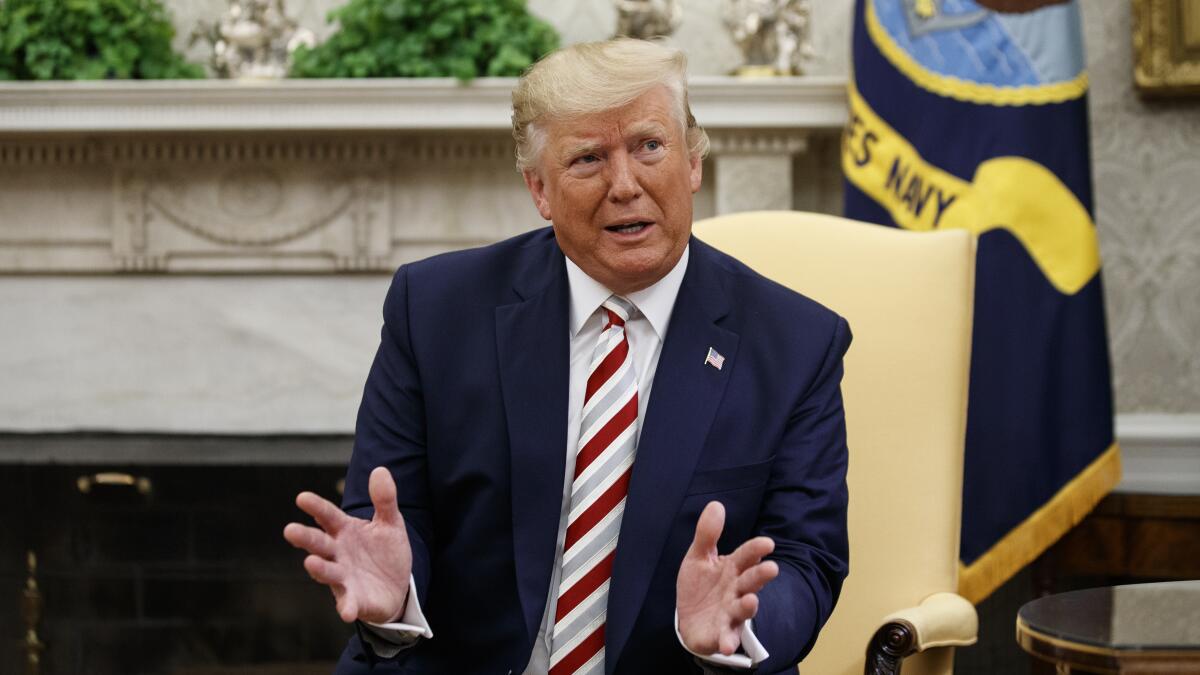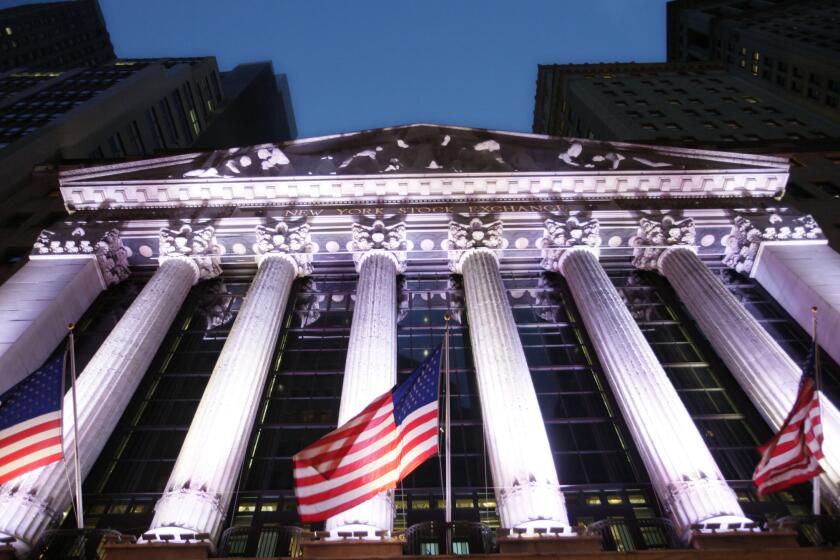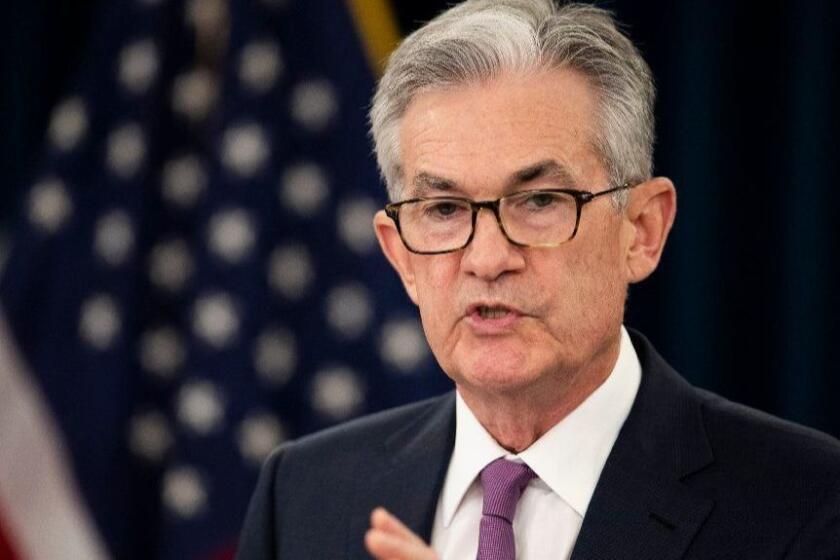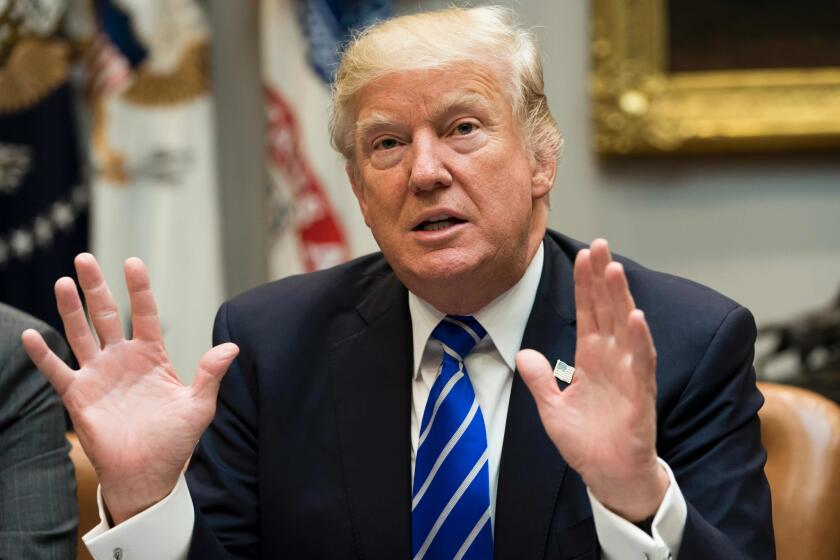Can Trump count on American consumers to save the economy from recession?

- Share via
WASHINGTON — As President Trump considers tax cuts and other ways to bolster a weakening economy and his reelection prospects, the financial wild card may be the American consumer.
Americans have been spending heartily in recent months, outperforming expectations and compensating for the softness in business investments, manufacturing and net exports due largely to Trump’s trade war with China.
“The consumer continues to be the Atlas holding up the economy,” said Jack Kleinhenz, chief economist for the National Retail Federation.
But for how long?
The United States this summer broke the record for the longest economic expansion, but many economists now see a recession — typically defined as two or more consecutive quarters of declining output — hitting next year or in 2021.
And the outlook dimmed Friday after the United States and China announced an escalation of tit-for-tat tariffs. Trump also continued his verbal attack on China and essentially labeled Chinese President Xi Jinping an “enemy” — a stark change after having previously lavished praise on Xi and referring to him as a great friend.
So far, the U.S.-China trade conflict hasn’t slowed consumer spending, which accounts for more than two-thirds of American economic activity.
Their spending has been supported by the tight labor market, rising incomes and relatively low household debts. The recent upheaval in financial markets and some key indicators flashing red, however, have begun to weigh on consumers’ moods. And sentiments can be both contagious and self-fulfilling.
Any reassurance that markets got from the Federal Reserve on Friday was wiped out by a volley of acrimonious tweets from President Trump and a nasty turn in the U.S.-China trade war.
One closely followed national survey, by the University of Michigan, saw a sharp drop in consumers’ expectations earlier this month, shortly after the Federal Reserve cut interest rates and Trump announced more tariffs on China.
By historical measures, consumer confidence remains high, but the survey’s director, Richard Curtin, noted that demand already was softening for some large discretionary items, including early-warning indicators such as recreational vehicles.
As it is, Americans have been socking away more money. In recent months the personal saving rate, the amount of after-tax income that isn’t spent, has been hovering around 8%, the highest in several years.
Consumers haven’t yet turned from uncertainty to pessimism, Curtin said, but are taking their cues from people like Federal Reserve Chairman Jerome H. Powell. “They’re thinking, ‘If he’s going to be more cautious, so should I.’”
The Fed, worried about trade and the global outlook, shaved a quarter-point off its benchmark interest rate on July 31. And Powell indicated Friday that the central bank is prepared to do more to sustain economic growth, which has slowed to about 2%, a still healthy pace, from almost 3% last year.
But in his speech at the Fed’s annual retreat in Jackson Hole, Wyo., Powell did not commit to making rate cuts, let alone of the magnitude that Trump has demanded — a full one-percentage-point reduction in the Fed’s benchmark rate, which now stands between 2% and 2.25%.
Fed policymakers are divided, and uncertainty in the trade outlook has been a particular challenge. There are “no precedents to guide any policy response to the current situation,” Powell said.
Fed rate cuts could help ease recession fears, which have intensified with Trump’s escalation of tariffs and weaker economic data from Europe and China. What’s more, yields on 10-year Treasury notes have kept falling, briefly slipping below yields on two-year notes — a scenario considered a harbinger of a downturn.
Jerome Powell said the U.S. economy is OK but faces “significant risks,” reinforcing bets for September interest-rate cut. That didn’t mollify Trump.
Economists say economic expansions don’t die of old age, but longevity isn’t irrelevant either when it comes to things like purchases of new cars. Auto sales were fueled by pent-up demand from the Great Recession, but they have since peaked and can’t be expected to keep growing.
Similarly, home prices nationally have risen to a point that could slow an already lackluster housing market. Less home-building has meant less for furniture and appliance dealers.
Fed rate cuts could help lift the market, but they won’t have a “wow factor,” said G.U. Krueger of Krueger Economics, a housing research consultant in Los Angeles.
Availability of credit hasn’t been a problem for most businesses and households. The good news, he noted, is that there aren’t a lot of financial imbalances or excesses in the economy. Unlike in the last downturn, homeowners aren’t mortgaged to the hilt, and the quality of loans in general is much better.
Lenders, however, have begun to tighten up on some types of consumer credit. Retailers and other businesses worry that Trump’s new tariffs on many household goods made in China will only make things worse for consumers.
About a third of some $300 billion of Chinese imports — including athletic footwear, coats and electronics such as televisions sets — now face additional 15% tariffs next month.
Trump delayed 15% tariffs on most of the rest, including laptops and cellphones, to Dec. 15, saying he didn’t want to endanger the Christmas shopping season.
At the same time, he has sounded more enthused about tariffs and his trade fight with China in recent days. “I am the chosen one” to take on China on trade, he said Wednesday. On Friday, he tweeted that American companies “are hereby ordered to immediately start looking for an alternative to China,” and instead make products in the United States.
If the new tariffs do take effect, as now expected, they could pinch households. Some companies may end up eating the higher tariffs to maintain market share. But for products like video game consoles, where China dominates 98% of the $5-billion import market, consumers are almost certain to absorb at least some of the hit, said Shawn DuBravac, president of the research firm Avrio Institute and former chief economist at the Consumer Technology Assn.
The move comes in retaliation to President Trump’s planned Sept. 1 duty increase in the trade war.
“While the consumer is doing very well, you do have an environment where the consumer is also cautious and could easily retreat if uncertainty is high,” he said.
No one knows how much the trade war has already cost American businesses. Many say they have suspended or curtailed investments; some are rerouting supplies; and on the whole corporate profits have fallen this year.
For some companies, the higher costs from the trade war have erased the gains from the Republican tax cuts that Trump pushed for in late 2017.
Trump himself has insisted that the U.S. economy is performing very well. Yet the president has been relentless in hammering the Fed to lower interest rates to bolster growth — “The only problem we have is Jay Powell and the Fed. He’s like a golfer who can’t putt, has no touch,” Trump tweeted Wednesday.
At the same time, Trump has acknowledged that he is looking at a payroll tax cut, among other tax changes, that could put more money into consumers’ pockets and stimulate the economy. Administration officials reportedly have talked about other ideas, including a currency transaction tax that could weaken the dollar and make U.S. goods sold in foreign markets less expensive.
Scott Hoyt of Moody’s Analytics notes that one of the drivers for spending growth in recent years was expanding net worth of households, the so-called wealth effect. But stock prices today are about where they were 18 months ago, he said, and home prices began to slow last year.
“Financial wealth effects have been particularly large since the financial crisis, so the weakness of the stock market will be a particular weight,” he wrote in a research report.
For many consumers, the deciding factor in whether they keep spending at their current pace or pull back is how they view their jobs.
With national unemployment very low at less than 4%, jobs have been more secure and wage increases have picked up in the last couple of years, especially for those at the bottom.
Layoffs remain low and job growth, while slowing, is still more than enough to keep up with the population increase and prevent the jobless rate from rising.
Economists say that at the moment, it’s hard to see how consumers can drive the economy into a ditch. The tricky thing, however, is that when households cut back, it’s often too late, said Krueger.
“Usually consumers are the last ones to jump off the cliff of a recession,” he said.
More to Read
Inside the business of entertainment
The Wide Shot brings you news, analysis and insights on everything from streaming wars to production — and what it all means for the future.
You may occasionally receive promotional content from the Los Angeles Times.














